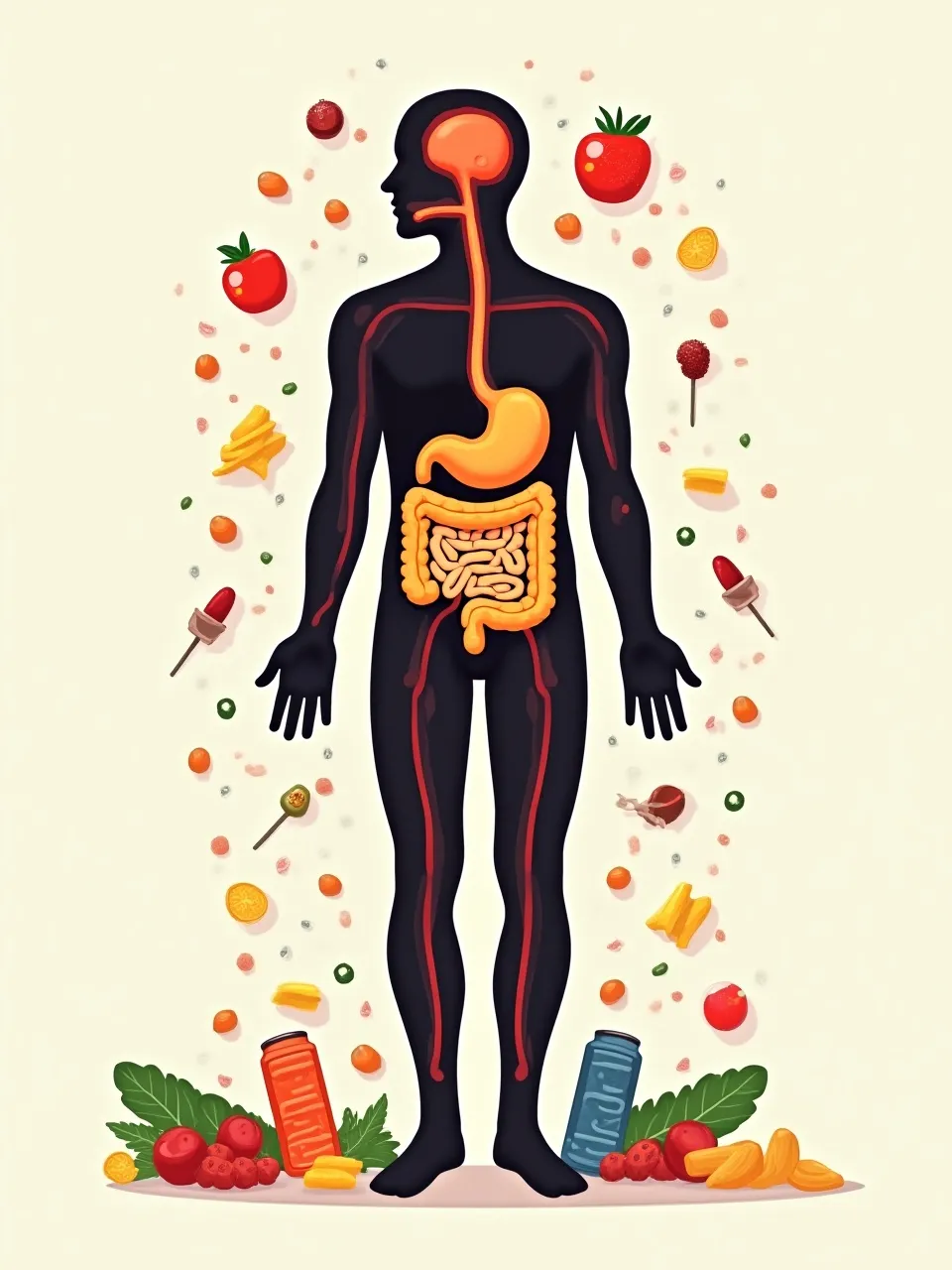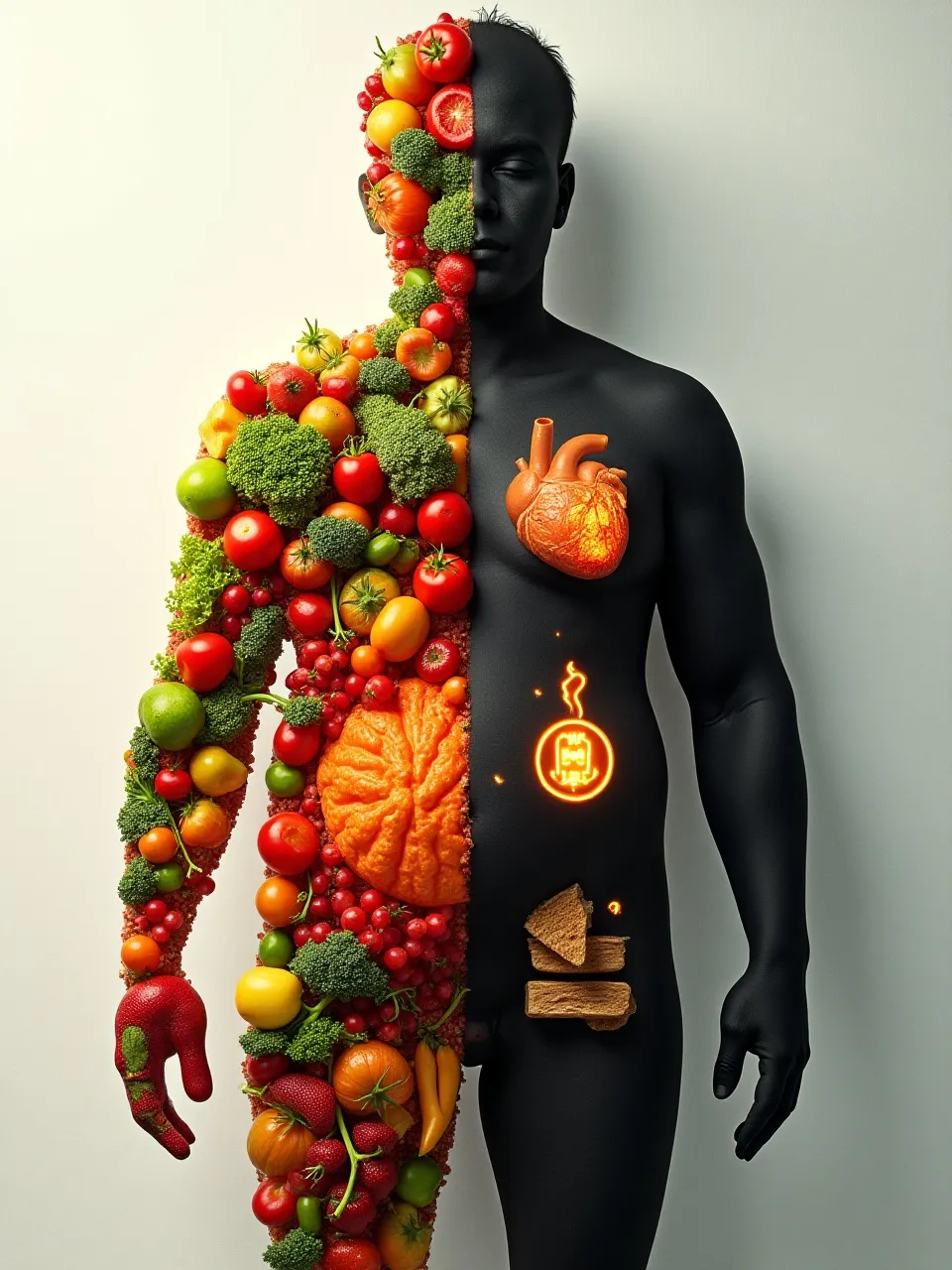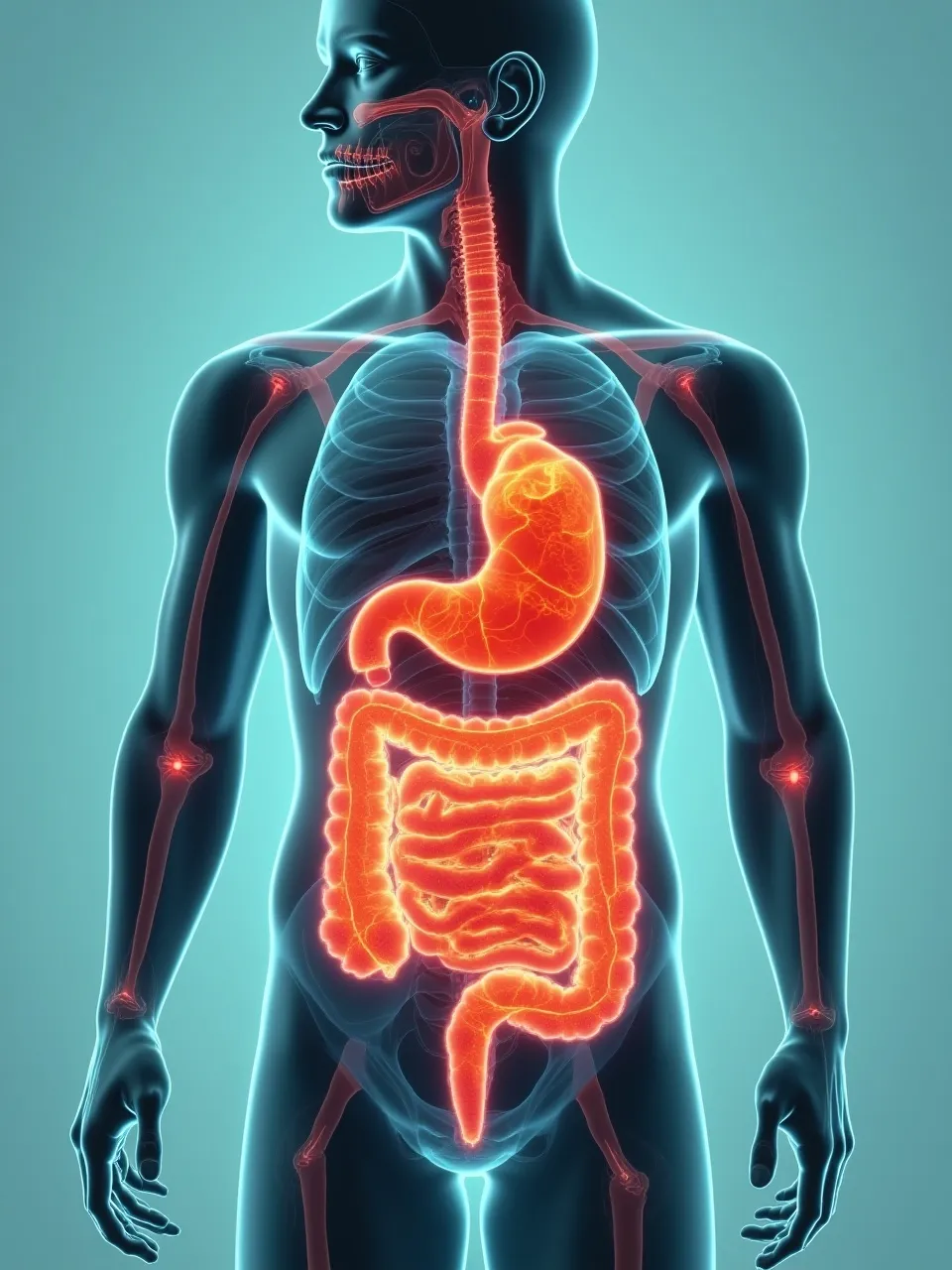Contents
- 🥫 What Are Ultra-Processed Foods?
- 🥦 How Ultra-Processed Foods Differ from Whole Foods
- ⚠ Immediate Effects of Ultra-Processed Foods on the Body
- 🚨 Long-Term Health Consequences of Eating Ultra-Processed Foods
- ⚠ Gut and Heart Health Risks of Ultra-Processed Foods
- 🧠 How Ultra-Processed Foods Impact Mental Health and Brain Function
- ✅ Reducing the Impact of Ultra-Processed Foods
Ultra-processed foods have become a staple in modern diets because they’re fast, cheap, and convenient. Think chips, sodas, candy bars, instant noodles, and fast-food burgers—they’re everywhere. These products are heavily engineered with added sugars, unhealthy fats, salt, and artificial additives designed to make them last longer and taste irresistible.
But here’s the catch: while ultra-processed foods are easy to grab, they’re not easy on your health. Studies show that consuming too much of them can increase the risk of obesity, type 2 diabetes, heart disease, and even shorten your lifespan. These foods can also disrupt hormones, spike blood sugar, and lead to inflammation, leaving you tired and craving more junk.
The good news? You don’t have to overhaul your diet overnight. With a few simple swaps and smart strategies, you can cut back on ultra-processed foods and start feeling better—more energy, improved mood, and stronger overall health.
In this guide, you’ll discover why ultra-processed foods harm your body and how to replace them with simple, wholesome alternatives without sacrificing taste or convenience.
🥫 What Are Ultra-Processed Foods?
Ultra-processed foods are products that have been significantly altered from their original form, often using industrial techniques and multiple additives. Unlike minimally processed foods—such as frozen vegetables or canned beans—ultra-processed items are packed with ingredients you wouldn’t normally use in home cooking.
These include:
- Artificial flavors and colors
- Preservatives to extend shelf life
- High amounts of refined sugars, unhealthy fats, and sodium
The goal of these changes? Make food taste irresistible, last longer, and require little to no preparation. While that sounds convenient, these foods are linked to several long-term health risks.
✅ Common Examples of Ultra-Processed Foods
You’ve probably eaten some today without even realizing it. Ultra-processed foods include:
- Soft drinks and sugary beverages
- Packaged snacks like chips, candy, and cookies
- Frozen or instant meals such as pizza, noodles, and ready-to-eat dinners
- Fast food items like burgers and fries
- Highly processed bread and sweetened yogurt found in most grocery aisles
These foods dominate modern diets because they’re cheap, accessible, and convenient. However, they often contain empty calories and harmful additives, which can contribute to weight gain, blood sugar spikes, and chronic health issues when eaten regularly.
🥦 How Ultra-Processed Foods Differ from Whole Foods
The difference between whole foods and ultra-processed foods is like night and day. Whole foods are natural and close to their original state, such as:
- Fresh fruits and vegetables
- Whole grains
- Nuts and seeds
- Lean meats and fish
These foods retain their original nutrients, fiber, and natural flavors, making them the foundation of a healthy diet.
Ultra-processed foods, on the other hand, undergo multiple industrial processing steps that strip away nutrients and add artificial ingredients. Instead of supporting your health, they often contain empty calories, added sugars, and unhealthy fats, which can contribute to:
- Weight gain and obesity
- Increased blood sugar levels
- Heart disease and diabetes
✅ Ingredients Commonly Found in Ultra-Processed Foods
These products are packed with substances you’d rarely use in your home kitchen, such as:
- Artificial colors and flavors – to make products look and taste appealing
- Preservatives – to extend shelf life
- Artificial sweeteners – for sweetness without natural sugar
- Emulsifiers and stabilizers – to improve texture
- Hydrogenated oils – linked to harmful trans fats
These additives make foods tastier and more convenient, but they offer little to no nutritional value and often make the products highly addictive.
⚠ Immediate Effects of Ultra-Processed Foods on the Body
Eating ultra-processed foods doesn’t just harm your health over time—it can affect how you feel within hours. From sudden energy crashes to stomach discomfort, these foods can throw your body out of balance almost immediately.
🍬 Blood Sugar Spikes and Crashes
Most ultra-processed foods are loaded with refined carbs and added sugars, which quickly enter your bloodstream and cause a sharp rise in blood sugar. In response, your body releases a surge of insulin to bring levels down—often too quickly.
This rapid spike-and-crash cycle can lead to:
- Jitters and irritability right after eating
- Energy crashes, leaving you tired and sluggish
- Increased hunger, making you crave even more sugar
Over time, these fluctuations increase the risk of insulin resistance and type 2 diabetes, but the short-term effects—fatigue and mood swings—are just as noticeable.
✅ Better Choice: Opt for whole foods with fiber and protein, like fruit with nuts, to keep blood sugar steady.
🥴 Digestive Discomfort
Ultra-processed foods often lack fiber and are packed with additives, emulsifiers, and preservatives that can disrupt digestion and irritate the gut. Common effects include:
- Bloating and gas
- Stomach cramps
- Irregular bowel movements or constipation
Fiber is essential for healthy digestion, but when it’s missing—as in most packaged snacks and frozen meals—your gut slows down. Some artificial ingredients may also disturb gut bacteria, leading to inflammation and discomfort.
✅ Better Choice: Include fiber-rich foods like vegetables, fruits, and whole grains, and drink plenty of water for smoother digestion.
Here’s a polished, expanded, and SEO-optimized rewrite for your section:
🚨 Long-Term Health Consequences of Eating Ultra-Processed Foods
While the short-term effects of ultra-processed foods can leave you feeling tired and bloated, the long-term impact is far more serious. Regularly consuming these products is strongly linked to chronic illnesses, obesity, and heart problems that can affect both lifespan and quality of life.
🩺 Higher Risk of Chronic Diseases
Research shows that people who eat large amounts of ultra-processed foods face a significantly higher risk of developing major diseases, such as:
- Type 2 diabetes
- Heart disease and high blood pressure
- Certain cancers
- Dementia and cognitive decline
One major study found that individuals with the highest intake of ultra-processed foods had a 31% greater risk of early death. Why? These foods are packed with sugars, trans fats, and chemical additives, which increase inflammation, oxidative stress, and insulin resistance—all key drivers of chronic illness.
✅ Bottom line: The more often you choose these foods, the more likely you are to face long-term health complications.
⚖ Weight Gain and Obesity
Ultra-processed foods are a triple threat: high in calories, low in nutrients, and engineered to make you eat more. Most are loaded with added sugars and unhealthy fats, which not only boost calorie intake but also fail to keep you full—leading to overeating.
Studies consistently link high consumption of these foods with higher obesity rates. Over time, excess weight can lead to:
- Type 2 diabetes
- Hypertension (high blood pressure)
- Joint problems and mobility issues
✅ Better Approach: Swap calorie-dense snacks for whole-food alternatives like fruit with nuts or Greek yogurt with berries.
⚠ Gut and Heart Health Risks of Ultra-Processed Foods
Ultra-processed foods don’t just affect weight and blood sugar—they also disrupt your gut health and put extra strain on your heart. Over time, these changes can increase the risk of serious illnesses.
🦠 Gut Microbiome Imbalance
Your gut microbiome—the collection of beneficial bacteria in your digestive system—plays a key role in digestion, immunity, and even mental health. But a diet high in ultra-processed foods can throw this delicate system off balance.
Why?
- Artificial additives, emulsifiers, and preservatives found in processed foods can kill or reduce healthy gut bacteria.
- This imbalance (dysbiosis) can lead to bloating, digestive discomfort, and inflammation.
- Over time, a disrupted gut microbiome has been linked to weakened immunity, mood disorders, and higher risk of chronic disease.
✅ Better Choice: Include probiotic-rich foods like yogurt, kefir, sauerkraut, and prebiotic fibers (bananas, oats) to support gut health.
❤️ Impact on Heart Health
Ultra-processed foods are a major contributor to cardiovascular problems, thanks to their high levels of:
- Sodium – raises blood pressure and increases strain on arteries.
- Trans fats and hydrogenated oils – clog arteries, reducing blood flow.
- Added sugars – promote obesity and increase heart disease risk.
Over time, these factors can lead to hypertension, atherosclerosis, heart attacks, and strokes. A diet low in whole foods and high in processed products almost guarantees higher heart risks.
✅ Better Choice: Replace salty snacks and processed meats with fresh fruits, vegetables, lean protein, and healthy fats like olive oil and nuts to protect your heart.
🧠 How Ultra-Processed Foods Impact Mental Health and Brain Function
Ultra-processed foods don’t just affect your waistline—they can also influence mood, mental clarity, and cognitive performance. High in sugar, unhealthy fats, and artificial additives, these foods disrupt the body’s natural balance and can negatively impact mental well-being over time.
😔 Mood Fluctuations and Emotional Health
One of the most immediate effects of ultra-processed foods on mental health is unstable mood. Why does this happen?
- Sugar and refined carbs cause rapid blood sugar spikes and crashes, leading to irritability, fatigue, and mood swings.
- Artificial additives and preservatives may disrupt neurotransmitters that regulate mood, contributing to emotional imbalances.
Several studies have linked diets high in ultra-processed foods to greater risks of depression and anxiety. Over time, these foods can reduce levels of serotonin—the “feel-good” hormone—while promoting inflammation, both of which are associated with poor mental health.
✅ Better Choice: Replace processed snacks with fresh fruits, nuts, or yogurt to maintain stable energy and mood.
🧩 Cognitive Decline and Reduced Focus
Ultra-processed foods are low in essential nutrients like omega-3s, B vitamins, and antioxidants—all crucial for brain health. A lack of these nutrients combined with excessive artificial additives can:
- Reduce memory performance
- Slow reaction times
- Make focusing harder
Research suggests that frequent consumption of these foods is linked to poorer learning ability and increased risk of cognitive decline later in life. Some experts even associate high processed food intake with a higher chance of developing dementia.
✅ Better Choice: Incorporate whole foods like fatty fish, leafy greens, and whole grains to support long-term brain function.
✅ Reducing the Impact of Ultra-Processed Foods
Cutting back on ultra-processed foods doesn’t have to mean giving up flavor or convenience. Small, consistent changes can significantly improve your health by lowering the risk of obesity, heart disease, and chronic illnesses. The key is to start gradually and make smart swaps that feel natural.
🛒 Tips for Making Healthier Choices
- Read Labels Carefully
- If a product has a long list of unfamiliar ingredients, artificial colors, flavors, or preservatives, it’s likely ultra-processed.
- Plan Meals Ahead
- Preparing simple, wholesome dishes at home helps you avoid the temptation of quick processed options. Batch-cooking or prepping veggies in advance can make this easier.
- Prioritize Whole Foods
- Stock up on fruits, vegetables, whole grains, lean proteins, nuts, and seeds. These provide fiber, vitamins, and minerals your body needs.
- Choose Water Over Sugary Drinks
- Swap soda or sweetened beverages for water, herbal tea, or infused water for hydration without added sugar.
- Take It Slow
- Gradual changes work best. Start by replacing one or two processed snacks with healthier options each day to avoid feeling deprived.
🔄 Smart Swaps for Everyday Meals
- Breakfast:
❌ Sugary cereal → ✅ Plain oatmeal with fresh fruit and nuts - Snacks:
❌ Packaged chips or cookies → ✅ Mixed nuts, cut vegetables, or fresh fruit - Lunch:
❌ Processed deli meats on white bread → ✅ Whole-grain sandwich with lean protein and fresh veggies - Dinner:
❌ Frozen ready meals → ✅ Quick stir-fry with colorful veggies and lean meat
❌ Canned soup with additives → ✅ Homemade broth-based soup with whole ingredients
By making these small but impactful changes, you’ll improve energy levels, reduce cravings, and boost overall health without feeling overwhelmed.












Yeah, no duh. I knew this already, but it’s good to see it spelled out. It’s like, I *know* that ramen at 2 AM isn’t the best choice, but sometimes…man, sometimes that ramen is *calling my name*. This article just confirms my suspicions that I’m slowly killing myself with deliciousness. Maybe I’ll try to eat a salad…tomorrow. 😉